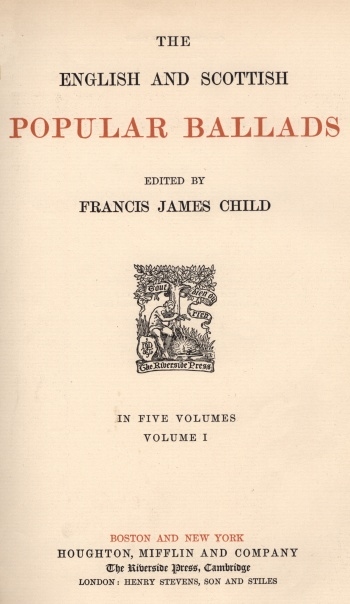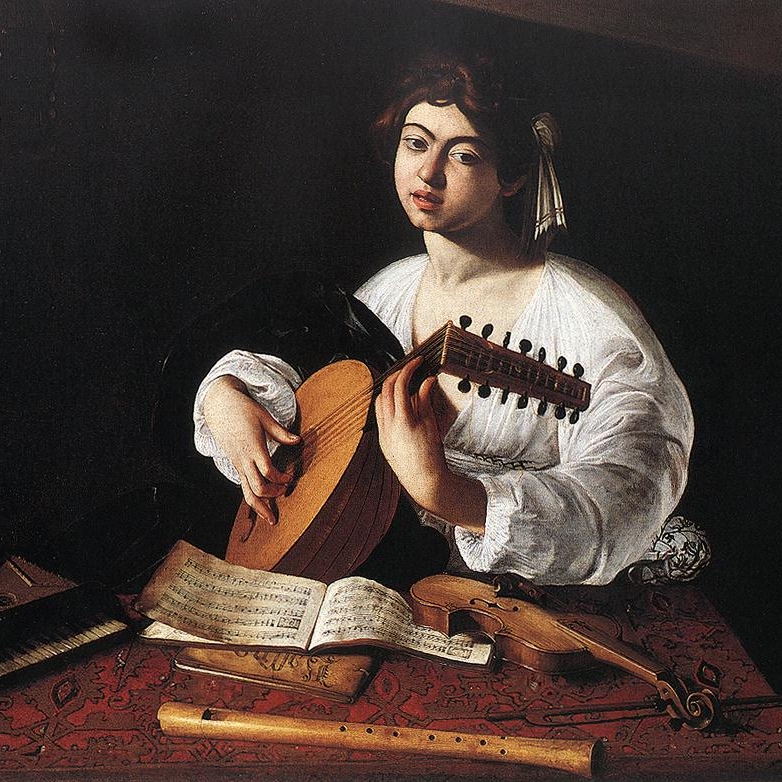In order to preserve the historical integrity of the ballads in this section they are presented in their original dialects, which span a broad range. These ballads have been passed down through the centuries from many different regions of Great Britain before appearing in print. A synopsis of each ballad, in modern American English, is provided to aid in ease of comprehension of the dialects.
Childe Waters in his stable stoode,
And stroaket his milke-white steede;
To him came a faire young ladye
As ere did weare womans weede.
Saies, "Christ you save, good Chyld Water!"
Sayes, "Christ you save and see!
My girdle of gold, which was too longe,
Is now to short for mee.
"And all is with one chyld of yours,
I feele sturre at my side;
My gowne of greene, it is to strayght;
Before it was to wide."
"If the child be mine, Faire Ellen," he sayd,
"Be mine, as you tell mee,
Take you Cheshire and Lancashire both,
Take them your owne to bee.
"If the child be mine, Faire Ellen," he sayd,
"Be mine, as you doe sweare,
Take you Cheshire and Lancashire both,
And make that child your heyre."
Shee saies, "I had rather have one kisse,
Child Waters, of thy mouth,
Then I wold have Cheshire and Lancashire both,
That lyes by north and south.
"And I had rather have a twinkling,
Child Waters, of your eye,
Then I wold have Cheshire and Lancashire both,
To take them mine oune to bee."
"To-morrow, Ellen, I must forth ryde,
Soe farr into the north countrye;
The fairest lady that I can find,
Ellen, must goe with me."
"And ever I pray you, Child Watters,
Your footpage let me bee!"
"If you will my footpage be, Ellen,
As you doe tell itt mee,
Then you must cutt your gowne of greene
An inche above your knee.
"Soe must you doe your yellow lockes,
Another inch above your eye;
You must tell noe man what is my name;
My footpage then you shall bee."
All this long day Child Waters rode,
Shee ran bare foote by his side;
Yett was he never soe curteous a knight
To say, "Ellen, will you ryde?"
But all this day Child Waters rode,
Shee ran barfoote thorow the broome;
Yett he was never soe curteous a knight
As to say, "Put on your shoone."
"Ride softlye," shee said, "Child Waters;
Why doe you ryde soe fast?
The child which is no mans but yours
My bodye itt will burst."
He sayes, "Sees thou yonder water, Ellen,
That flowes from banke to brim?"
"I trust to God, Child Waters," shee said,
You will never see mee swime."
But when shee came to the waters side,
Shee sayled to the chinne;
"Except the lord of heaven be my speed,
Now must I learne to swime."
The salt waters bare up Ellens clothes,
Our Ladye bare upp her chinne,
And Child Waters was a woe man, good Lord,
To see Faire Ellen swime.
And when shee over the water was,
Shee then came to his knee:
He said, "Come hither, Faire Ellen,
Loe yonder what I see!
"Seest thou not yonder hall, Ellen?
Of redd gold shine the yates;
There's four and twenty fayre ladyes,
The fairest is my wordlye make.
"Seest thou not yonder hall, Ellen?
Of redd gold shineth the tower;
There is four and twenty faire ladyes,
The fairest is my paramoure."
"I doe see the hall now, Child Waters,
That of redd gold shineth the yates;
God give good then of your selfe,
And of your wordlye make!
"I doe see the hall now, Child Waters,
That of redd gold shineth the tower;
God give good then of your selfe,
And of your paramoure!"
There were four and twenty ladyes,
Were playing att the ball,
And Ellen, was the fairest ladye,
Must bring his steed to the stall.
There were four and twenty faire ladyes
Was playing att the chesse;
And Ellen, she was the fairest ladye,
Must bring his horsse to grasse.
And then bespake Child Waters sister,
And these were the words said shee:
"You have the prettyest footpage, brother
That ever I saw with mine eye;
"But that his belly it is soe bigg,
His girdle goes wonderous hye;
And ever I pray you, Child Waters,
Let him goe into the chamber with mee."
"It is more meete for a little footpage,
That has run through mosse and mire,
To take his supper upon his knee
And sitt downe by the kitchin fyer,
Then to goe into the chamber with any ladye
That weares soe rich attyre."
But when the had supped every one,
To bedd they took the way;
He sayd, "Come hither, my little footpage,
Harken what I doe say.
"And goe thee downe into yonder towne,
And low into the street;
The fairest ladye that thou can find,
Hyer her in mine armes to sleepe,
And take her up in thine armes two,
For filinge of her feete.
Ellen is gone into the towne,
And low into the streete;
The fairest ladye that shee cold find
Shee hyred in his armes to sleepe,
And tooke her in her armes two,
For filinge of her feete.
"I pray you now, good Child Waters,
That I may creepe in att your bedds feete;
For there is noe place about this house
Where I may say a sleepe."
This night and itt drove on affterward
Till itt was neere the day:
He sayd, "Rise up, my little ffoote-page,
And give my steed corne and hay;
And soe doe thou the good blacke oates,
That he may carry me the better away."
And up then rose Faire Ellen,
And gave his steed corne and hay,
And soe shee did and the good blacke oates,
That he might carry him the better away.
Shee layned her backe to the manger side,
And greivouslye did groane;
And that beheard his mother deere,
And heard her make her moane.
Shee said, "Rise up, thou Child Waters,
I thinke thou art a cursed man;
For yonde is a ghost in thy stable,
That greivouslye doth groane,
Or else some woman laboures of child,
Shee is soe woe begone."
But up then rose Child Waters,
And did on his shirt of silke;
Then he put on his other clothes
On his body as white as milke.
And when he came to the stable-dore,
Full still that hee did stand,
That hee might heare now Faire Ellen,
How shee made her monand.
Shee said, "Lullabye, my owne deer child!
Lullabye, deere child, deere!
I wold they father were a king,
Thy mother layd on a beere!"
"Peace now," he said, "good Faire Ellen,
And be of good cheere, I thee pray,
And the bridall and the churching both,
They shall bee upon one day."
The ballad Child Waters appears in Volume II of The English and Scottish Popular Ballads, edited by Francis James Child. These volumes are in the public domain.

The Child Ballads are 305 traditional ballads from England and Scotland, and their American variants, anthologized by Francis James Child during the second half of the 19th century. ... Read more at Wikipedia.

Ballads were particularly characteristic of the popular poetry and song of the British Isles from the later medieval period until the 19th century. ... Read more at Wikipedia.